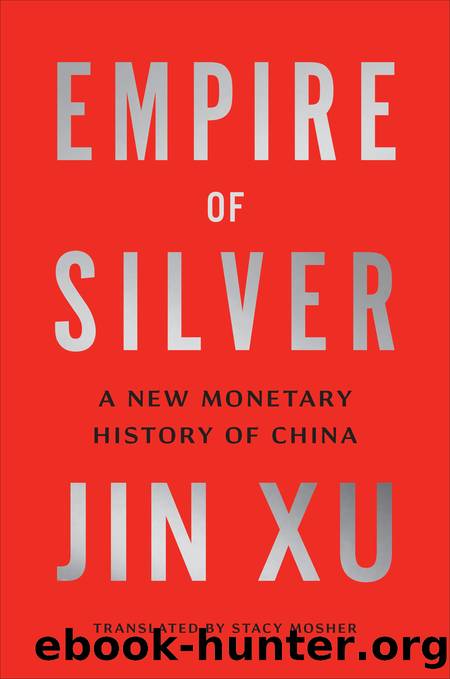Empire of Silver by Jin Xu;

Author:Jin Xu;
Language: eng
Format: epub
ISBN: 9780300258271
Publisher: Yale University Press
1840: Opium War or Silver War?
The shift from tribute to treaty did not happen overnight; historyâs dramatic changes always need the impetus of a trigger. In China this factor looked as if it was opium, in the West it looked as if it might be trade, and what linked them was silver. Subsequently opium was subjected to considerable moral censure and was even seen as a conspiracy against the âweak man of Asia,â but what lay behind it was the pursuit of profit.
As a topic, the Opium Wars have mystified people. Opium has a long record in the history of humanity, the term itself tracing back to Greece. Opium was introduced to China very early, with many records of it in the Ming dynasty, and some scholars believe that opium and poppies were introduced to China no later than the Tang dynasty.68 Opium originally emerged as a medicinal product; according to one telling, opium was more readily available in 1870 than cigarettes were in 1970. Opium was also a source of inspiration for literary people, with the British essayist Thomas De Quinceyâs Confessions of an English Opium-Eater a notable example. Excessive use of opium, however, caused addiction to increase dramatically, especially after the smoking method emerged in Fujian and Taiwan. By the nineteenth century, opium had become a symbol of evil in the West, and China became trapped between image and reality as a languid Oriental empire.
Historyâs amazing twists and turns always include chance details. The popularity and even the harm of opium in the Qing dynasty were closely related to changes in the manner of consumption. The British drank it dissolved it in water (consuming ten to twenty tons per year), a method that produced a mildly narcotic effect but nothing to worry about. The more addictive smoking method prevalent among the Chinese reportedly originated in Java and spread to mainland China through Taiwan (or Fujian). âThe difference was not unlike that between chewing coca leaves and lighting up a crack pipe. British drug dealers contrived to overlook this difference but the Daoguang Emperor did not, and in 1839 declared war on drugs.â69
The First Opium War, or Sino-British War, was not only a crucial turning point in Chinese history, but also a source of powerful national sentiment among many Chinese. Yet, history is not decided by a single incident, and our knowledge of the Opium War may be inadequate; different standpoints often lead to different inferences, especially in the case of emotionally charged historical incidents.
The lure and effects of opium are similarly confusing, both in China and in the rest of the world. Is opium a medicine or a hard drug? Did opium addiction originate in Asia or the West? Is opium consumption a moral problem or an economic problem? Was this war an opium war or a silver war? .â.â. Solving one problem often leads to another problem. Opium was the catalyst for war, and even more a dual metaphor for moral anxiety and national peril in Chinaâs
Download
This site does not store any files on its server. We only index and link to content provided by other sites. Please contact the content providers to delete copyright contents if any and email us, we'll remove relevant links or contents immediately.
| Africa | Americas |
| Arctic & Antarctica | Asia |
| Australia & Oceania | Europe |
| Middle East | Russia |
| United States | World |
| Ancient Civilizations | Military |
| Historical Study & Educational Resources |
The Story of China by Michael Wood(952)
Mr. Selden's Map of China by Timothy Brook(810)
Philippines--Culture Smart! by Culture Smart!(710)
Heroic Hindu Resistance To Muslim Invaders (636 AD to 1206 AD) by Sita Ram Goel(689)
Akbar: The Great Mughal by Ira Mukhoty(671)
First Platoon by Annie Jacobsen(660)
Food of India by unknow(660)
Vedic Physics: Scientific Origin of Hinduism by Raja Ram Mohan Roy(657)
Banaras by Diana L. Eck(648)
The Meaning of India by Raja Rao(648)
India--Culture Smart! by Becky Stephen(628)
China Unbound by Joanna Chiu(627)
North of South by Shiva Naipaul(617)
Mao's Great Famine: The History of China's Most Devastating Catastrophe, 1958-1962 by Frank Dikötter(607)
Insurgency and Counterinsurgency by Jeremy Black(595)
The Genius of China: 3,000 Years of Science, Discovery, and Invention by Robert Temple(592)
How to Be a Modern Samurai by Antony Cummins(583)
The Digital Silk Road by Jonathan E. Hillman(577)
A History of Japan by R.H.P. Mason & J.G. Caiger(576)
